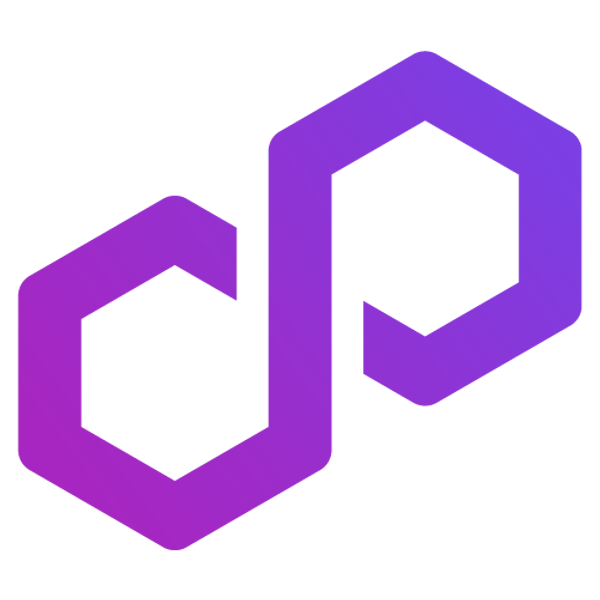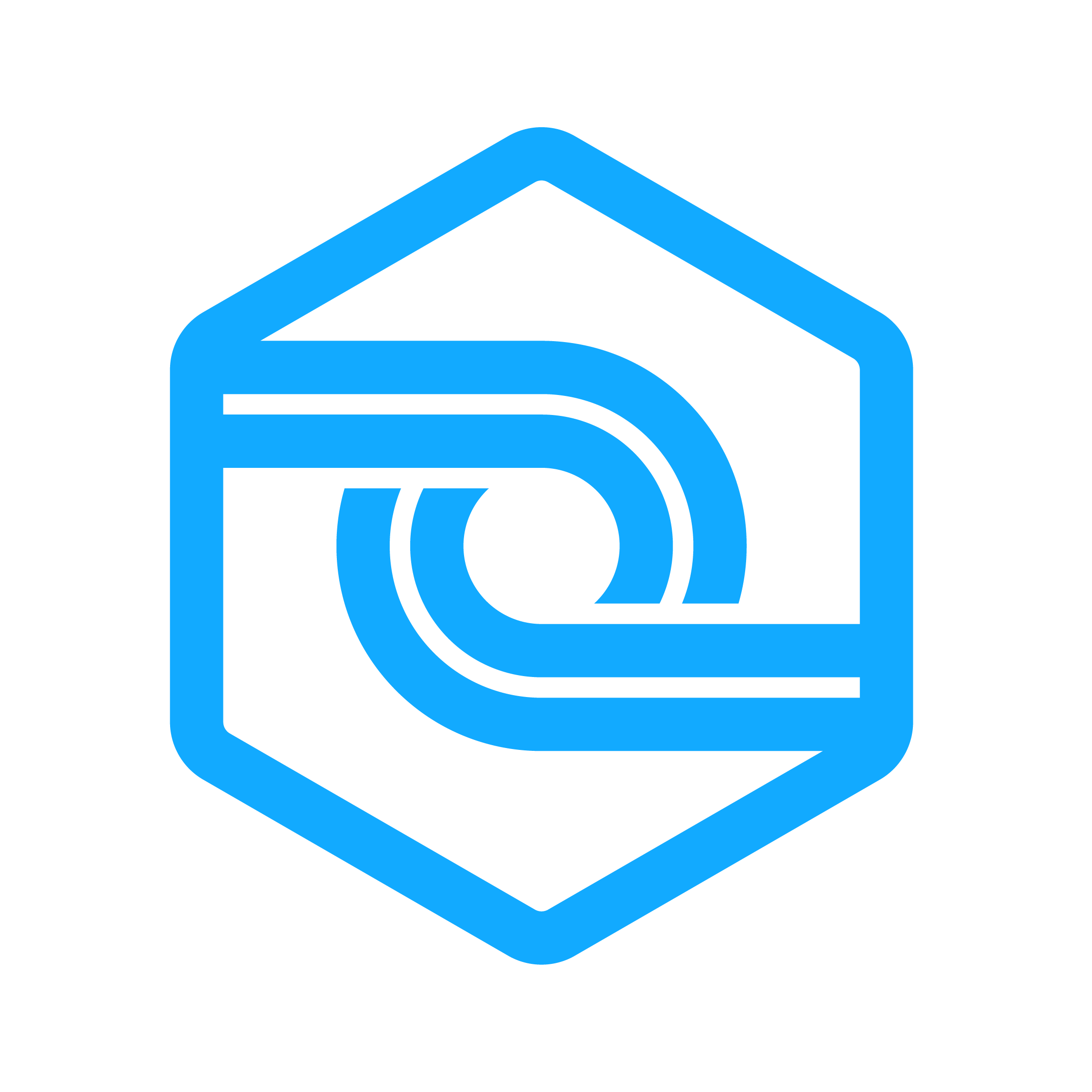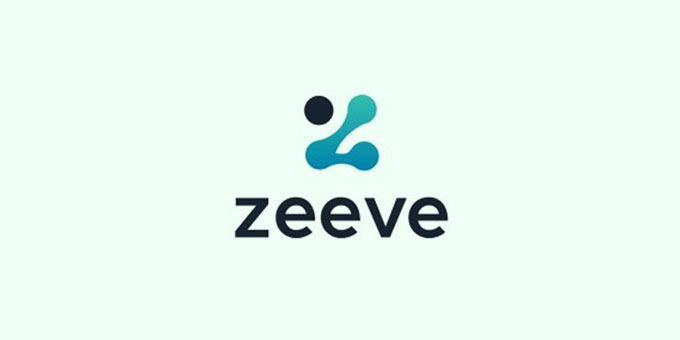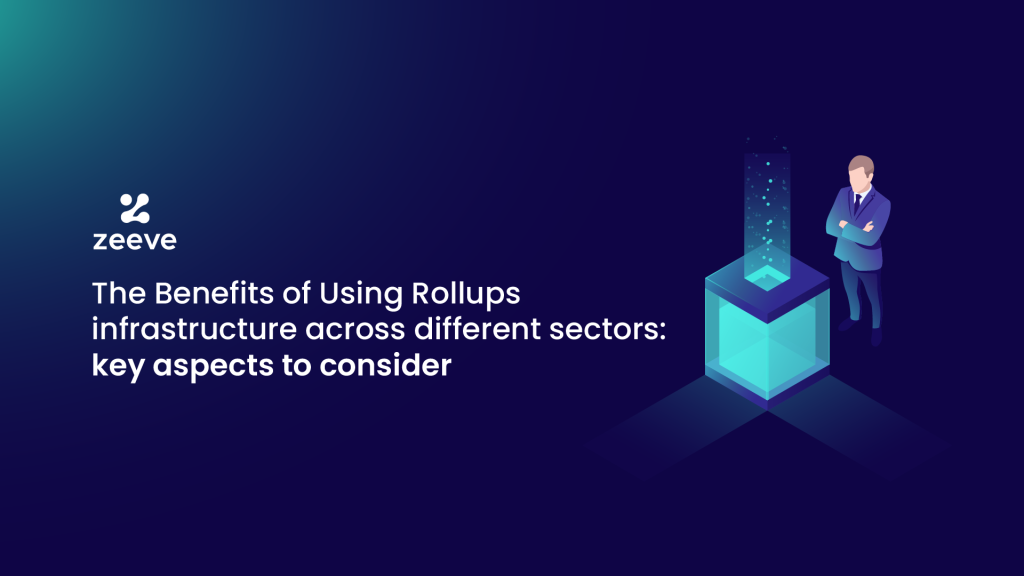If you are building a dApp, migrating from web2 application to web3, or you are planning to upgrade your existing blockchain infrastructure— a Rollups chain can be the ‘perfect’ solution depending on your use case-specific requirements. Here are a few key benefits of launching a sovereign rollups network across different sectors, starting from DeFi, web3 gaming, and digital asset marketplaces to institutional applications.
When to implement Rollup for your infrastructure?
There are many benefits of Rollups infrastructure, including privacy of data, security, interoperability, and more. However, there’s no denying that blockchain Rollups are built essentially to enhance the scalability on Layer-1. Speaking about the importance of Rollups, dApp projects that manage a huge user base with millions of daily active users can face network congestion that slows down the network, reduces its throughput capability, and creates user experience challenges.
By launching a Rollup chain either with Optimistic Rollups or zkEVM – dApps can execute transactions off-chain while their network is still deployed on the mainchain. Only the proof of transactions’ validity or transaction data is posted on Layer-1, which improves the scalability of the network as a whole. All this signifies that Rollups infrastructure is a viable scalability solution for dApps that require high TPS and next-level security features.
How Rollup Infrastructure is benefitting different industry sectors?
Decentralized Finance (DeFi)
Rollup infrastructure is a perfect fit for DeFi Projects spanning insurance, banking, TradeFi, decentralized exchange (DEX), payment apps, cross-chain bridges, and a lot more. Let’s learn more about what benefits Rollups offers to DeFi:
Higher throughput, unmatched speed with lower transaction cost: Rollups infrastructure offers significant improvements in the network’s throughput by processing all the transactions on a L2 chain. With that, blockchain Rollups claims to offer up to 10-100x better scalability for all kinds of DeFi projects. Such tremendous transaction speed is suitable for DeFi solutions to match TradFi standards while lowering the transaction cost. Compared to Layer-1, the transaction costs are considerably less on the Rollup networks because there is no matter of validating transactions from different projects. Instead, a single DeFi dApp can launch a separate Rollup chain to perform its network-level operations.
Greater degree of security: Rollups infrastructure sits on the top of base blockchain like Ethereum; it can leverage the security of the main chain. Plus, it can implement its own cryptographic techniques like Zk-proof to ensure there are no issues like stealing of funds, unauthorized ledger access, and other threats.
Full privacy through Anti-censorship features: Privacy is critical for DeFi institutions as they have to project public data, business strategy, and, most importantly– wealth-related data. Knowing this, Rollups adopts a unique mechanism that bundles the transactions and executes them on the Layer-2 Rollup chain. The validity proof for these transactions are then submitted to the main chain without revealing its specifications.
Avoid exploitation of Maximal Extractable Value (MEV): Launching a Rollup means a DeFi network has full control over its mem pool design, which allows the network administrator to either internalize or eliminate MEV and thereby mitigate the risk of MEV exploitation. The viable way of doing this is to implement a fair ordering scheme to ensure there is fairness and predictability in the ranking of transactions.
Web3 gaming
Gaming-centric projects have been launching rapidly in the web3 space, ranging from play-to-earn games, GameFi platforms, and fantasy sports games to sci-fi games. White gaming projects are highly popular; they may face some challenges related to scaling their infrastructure, maintaining end-to-end security, transaction costs, and more when the number of players increases. Such high volume web3 games can leverage the below benefits of Rollups infrastructure, eliminating all the existing and potential issues:
Massive scaling: Rollups-based gaming dApps are known to offer massive scalability even during high network demand, which makes Rollup a perfect fit for scalable web3 gaming applications. Looking at a real-world example, Immutable X– a zkEVM Rollup chain, which is powered by Polygon zkEVM, currently supports processing of up to 9,000 transactions per second (TPS). Hence, Gaming projects can accommodate millions of daily active players, and if the user base grows further, you can launch multi-Rollups, interoperable within themselves, for your game, scaling the next billion users seamlessly.
Options to offer gasless transactions: Further, you might want your players to interact gasless with your underlying blockchain, and you can customize that. This may enhance user participation and reduce the initial hindrance of playing a blockchain-based game. They don’t have to buy Ethereum or Matic to continue to play the game.
You have the power to do more: With Rollup infrastructure, gaming dApps can allow players to experiment with the ecosystem and contribute to growth without facing constraints due to growing traffic. For example, users can easily mint a new collection of NFTs and in-game assets; they can create their own digital marketplace to sell their NFT-based items and meanwhile buy assets from other in-game marketplaces.
NFTs and virtual worlds
Prominent brands like Meta, Disney, Hyundai, and Nike have created their NFT-based virtual world that provides users with a digital yet hyper-realistic experience of exploring their brand’s offerings and services. These NFT and virtual world projects can use Rollup infrastructure to scale massively and leverage the following benefits:
Ease of scaling: NFT and virtual worlds create a kind of new and exciting experience for the users, and hence, such projects often see the volume of users growing dramatically. This rapid user growth can slow down the network and increase the network’s transaction fee. With the implementation of OP or zkRollup, NFT projects can process transactions faster on an independent chain, thus delivering industry-leading throughput and infinite scaling.
Cross-platform interoperability: NFTs and virtual worlds may need to allow their audience to interact with different NFT projects for a variety of purposes, such as trading digital assets, utilizing smart contract logic, or just exploring a different ecosystem. Considering this, Rollups allows any NFTs, virtual worlds, and metaverse projects to optimize its Rollup infrastructure for maintaining interoperability with all the different ecosystems that use Rollups.
Enhanced Security and Liquidity: Rollups allow NFT projects to inherit the unparalleled security and liquidity of underlying blockchain and also from the other Rollup chains running on the same ecosystem. Hence, users on Rollup-based NFT projects can benefit from the ecosystem liquidity of the underlying chain, which could be a little tough to achieve in the case of a standalone blockchain solution.
Supply Chain
Supply chain companies can implement zkEVM or Optimistic Rollup into their existing infrastructure to transform their overall operations with the following key advantages:
Customizable workflow environment: Rollup infrastructure allows supply chain solutions to customize their entire supply chain workflow through smart contract programming. For example, you can integrate a ‘unique tracking system’ that maps the entire supply chain journey on a dashboard, giving supply chain companies greater visibility on each stage.
Freedom to set network-level permissions: Supply chain is an industry that is prone to counterfeiting, hacks, and frauds. With blockchain Rollups, a supply chain solution can set specific network-level permissions, defining who can join the ecosystem, who can perform transactions, and who all are authorized to validate the transactions.
Protection of sensitive supply chain data: Supply chain companies can rely on ZK-rollup infrastructure for protecting sensitive data and trade secrets while storing unalterable records on the main chain. That’s so because ZK-Rollups use an advanced form of cryptographic technique called Zero-knowledge proof that maintains privacy while ensuring accountability and transparency across the ecosystem.
Healthcare
Healthcare is another popular sector that uses blockchain for a variety of purposes, including the management of immutable patient data and tracing of pharmaceutical supply chains. However, the scalability trilemma has also been a core issue for the healthcare sector, which brings along a lot more challenges related to security and viability. That’s where Rollups helps. It offers the following main benefits for the healthcare companies:
Reduction in transaction fee: Rollups bundle all the healthcare-related transactions and offload them from the main chain, performing the execution off-chain. The computation of transactions on Rollup chain is cost-efficient and relatively fast since it is designed for the sole purpose of scaling the underlying chain. This way, a Rollup infrastructure enables novel healthcare solutions to reduce the congestion on its underlying Layer-1 ecosystem and thereby offer high transaction throughput and low network latency with considerably less gas fee.
Privacy of patient data: Given that protection of patient’s data is very important for healthcare institutions, Rollups allows healthcare organizations to host their privacy-focused smart contract on the Rollup infrastructure. This smart contract stores the data off-chain, which by default preserves the privacy and anonymity of patient/doctor details such as clinical prescriptions, diagnosis results, and pharmaceutical information. Only the proof of this data is submitted to Layer-1.
Interoperability between heterogeneous healthcare systems: Healthcare organizations often share information such as patient’s details, their past consultation-related information, and medicine recommendations across various healthcare institutions that work independently. All the healthcare systems that utilize Rollups technology can achieve interoperability with heterogeneous chains using zkEVM bridge designed to be easily integrated on any Layer-2 and layer-3 network.
Real estate industries
Despite generic benefits such as complete decentralization, faster processing of transactions, and project’s EVM-compatibility, the following are main benefits of Rollups infrastructure in the real estate industry:
Full control over the network: Real-estate projects differ from other web3 projects in terms of user base, demand for scalability, and operations. Therefore, Rollups are a perfect solution for real-estate companies to customize their Rollups network as per the specific needs of real-estate services, such as a certain gas fee, TPS capability, and implement advanced tracking and analysis features to make investments a fair deal in the real estate industry.
Transparent and secure storage of property data: Real estate projects deal with sensitive data related to property contracts, tax payments, owner screening details, and much more. All these types of data require high security and privacy to get protection against hacks, fraud, and manipulation. Rollups infrastructure provides real estate projects with a secure and transparent layer-2 ecosystem that executes all the transactions securely and stores the filtered data on the same while the validity proof is transferred to underlying blockchain. This way, data accessibility is granted to the stakeholders while users can authenticate the credibility of transactions with the proof stored on Layer-1.
Interoperability across different real-estate projects: Having robust interoperability in real-estate projects enables different parties to exchange information, access data from multiple sources, and thus enhance their business operations. With Rollups infrastructure, real estate projects can maintain interoperability with all the other layer-2s running on a Rollups-based ecosystem. Further, projects can leverage cross-rollups bridges designed to enable communication between Layer-1 and Layer-2 chains.
Institutional applications
Rollups implementation enables enterprise applications to build scalable dApps that can scale endlessly while leveraging the following main benefits:
Full customization: Rollups infrastructure offers a modular and extensible design that allows enterprises and web3 projects to configure their chain as per the use case-specific requirements. For example, you can add unique privacy parameters to the ecosystem, define data availability methods, gas fee configuration, design your sequencer type, etc.
Higher security: With Rollups, enterprises leverage the security of Layer-1 inherited directly into the Layer-2 chain. Further, the cryptographic proofs in Rollups guarantee the validity of transactions while safeguarding the user data and funds. Also, Rollups, with its censorship resistance feature, ensures that the information stored on the chain can never be altered or corrupted for any purpose.
Control on granting Accessibility permission: If you want to set specific accessibility permissions on your Rollups chain, you can do so by configuring the network’s genesis file. Here, you can add parameters such as who can deploy smart contracts on your chain (adding eligibility criteria), who can validate the transactions, or who can submit transactions to the ledger. This means you have full control over your Rollup infrastructure.
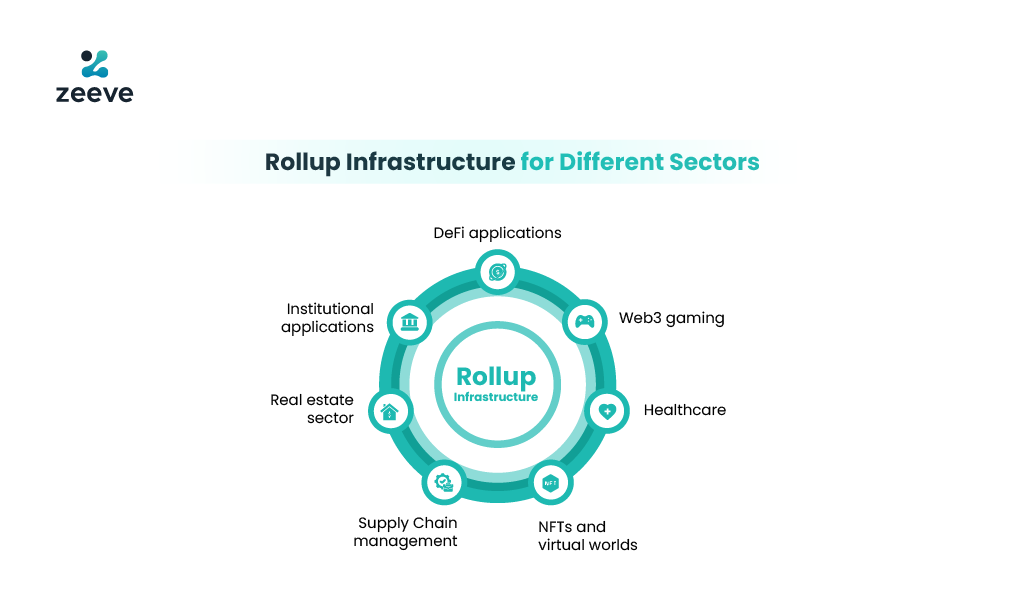
Launch your own Rollup chain with Zeeve
Blockchain Rollups are no doubt a perfect scaling solution for all kinds of blockchain projects. However, if you have decided to go for rollups, it could be a time and resource-intensive process, especially for businesses that are just starting out. You may require a dedicated DevOps team, high-end resources and specialized tools & frameworks. Zeeve takes away all the pain of launching a Rollups infrastructure with its Rollups-as-a-Service that simplifies the development and deployment of all the leading Rollups— be it Zk-Rollups or Optimistic Rollups solutions.
Zeeve offers a wizard-based configuration panel, easy-to-customize modules, and frameworks— enabling quick and seamless launch. Additionally, you get all the ready-to-deploy components, such as scalable nodes, white-labeled faucets, wallets, data indexing tools, RPC nodes, shared APIs, cross-chain bridges, and more. This saves your significant deployment time, thereby offering a faster time-to-market. Zeeve also ensures excellent uptime and performance of your Rollups network with its real-time monitoring dashboard that monitors your chain on vital parameters such as uptime, block height, disk usage, memory used, etc. Our service guarantees the reliability of your Rollups offering with ISO 27001 and SOC 2 Type 2 compliance and enterprise-level SLA. For more information about our blockchain offerings, rollups deployment, or anything web3– drop us an email to schedule a call with our blockchain experts.





